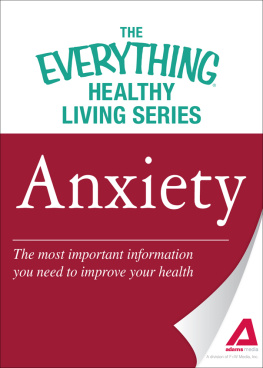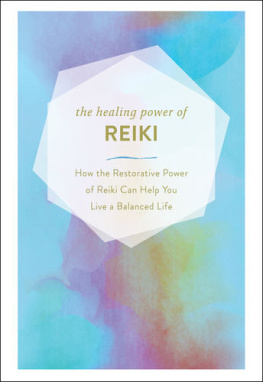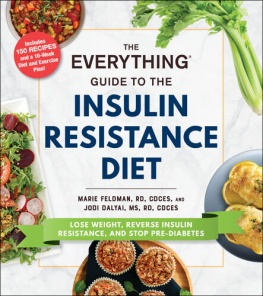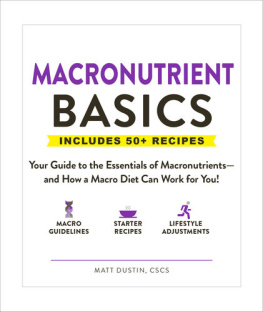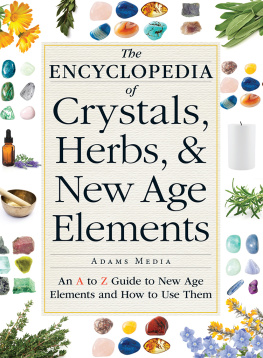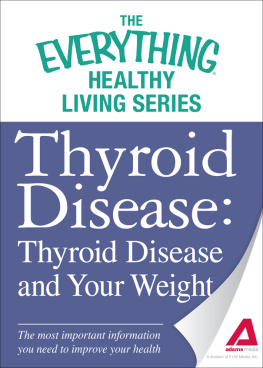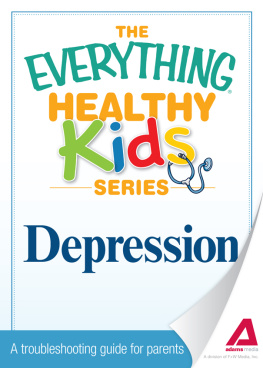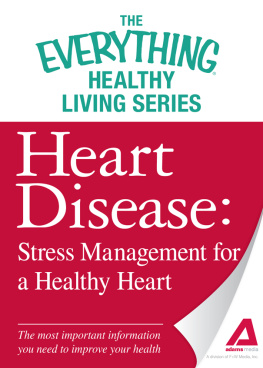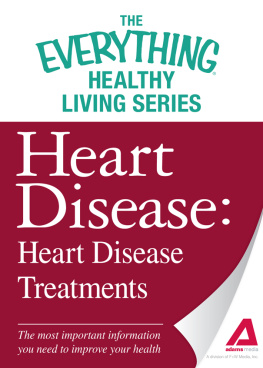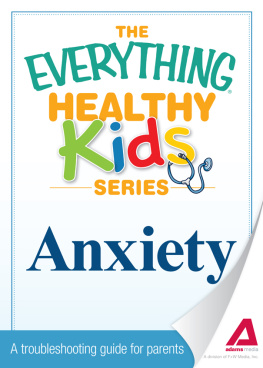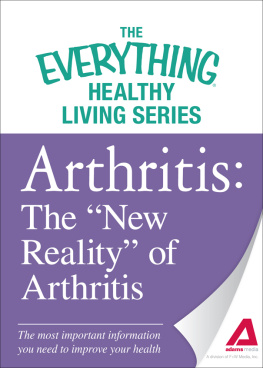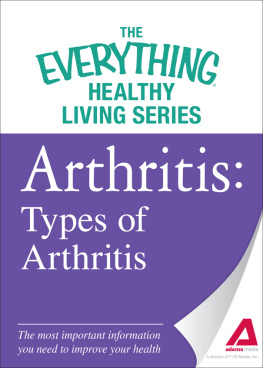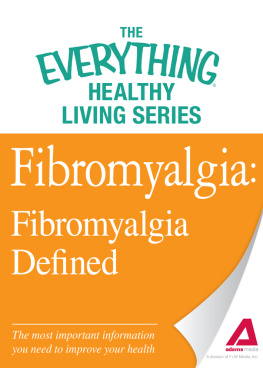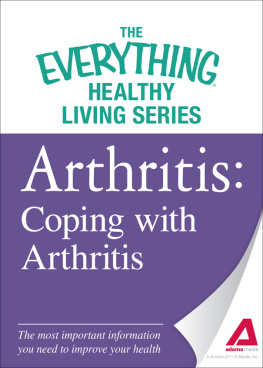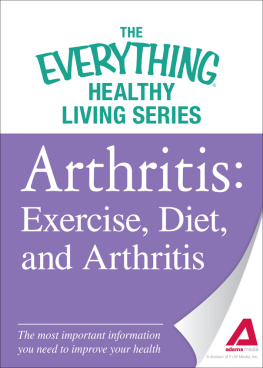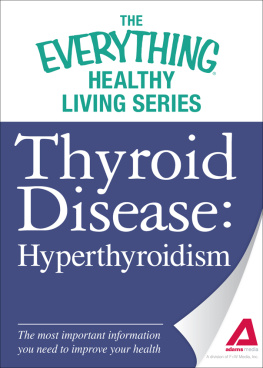Adams Media, a division of F+W Media, Inc.
For more than 10 years, millions of readers have trusted the bestselling Everything series for expert advice and important information on health topics ranging from pregnancy and postpartum care to heart health, anxiety, and diabetes. Packed with the most recent, up-to-date data, Everything health guides help you get the right diagnosis, choose the best doctor, and find the treatment options that work for you.
The Everything Healthy Living Series books are concise guides, focusing on only the essential information you need. Whether youre looking for an overview of traditional and alternative migraine treatments, advice on starting a heart-healthy lifestyle, or suggestions for finding the right medical team, theres an Everything Healthy Living Book for you.
Anxiety
Everyone experiences anxiety. Stressful situations make up a good portion of the day for most people. If you have to get your kids off to school every morning or have a daily commute on traffic-choked highways, you probably feel anxious during these times. Maybe you became anxious when you had to take a test in school and still do when you give a weekly report to your boss. Major life transitions, such as graduating from high school or college, or getting married or divorced, or experiencing the death of a loved one will cause extreme anxiety that can last for long periods of time.
Anxiety is part of living, of being human, and is an important component of your ability to set goals, perform at your best, and achieve what you put your mind to. Anxiety is also a warning mechanism telling you that things are not right or dangerous, propelling you to take action to protect yourself. In fact, without anxiety humankind would never have survived. It is a normal reaction to life situations that are unpleasant, sad, or scary.
General, manageable anxiety happens to everyone, but anxiety becomes a problem when it turns into a disruptive chronic condition that hinders how you function in daily life. Anxiety disorders are the most common mental health problem in the United States, and approximately 20 million adults, adolescents, and children have been diagnosed with an anxiety disorder. Disorders include panic disorders, social phobia, and stress disorders. Whether you or a family member develops an anxiety disorder depends on any number of related factors, such as heredity, life experiences, and coping skills.
If you or a loved one has been diagnosed with an anxiety disorder there are many conventional and alternative treatments that can help ease acute symptoms and set you on the path to healing and recovery. The most important elements in controlling anxiety include awareness, education, getting professional help, treatment, and reaching out for support. It can be intimidating and difficult to admit that you are having significant problems functioning in your daily life, but not getting help can lead to a chronic condition and years of suffering.
Anxiety disorders are often misunderstood and many people think you should be able to overcome symptoms of anxiety by sheer willpower. If you have an anxiety disorder you know this is untrue. This book includes information about anxiety and its disorders, conventional treatments as well as alternative therapies, and how changing your lifestyle can go a long way to vastly improving the way you feel. Youll also find resources and information on the latest research and self-help exercises and techniques to set you on your way to recovery.
Often the hardest part of getting control of your anxiety is recognizing that you have a problem and that you need help. In picking up this book, youve already done that, so youre well on your way. Just stick with it, be optimistic, and read on help is only a few pages away.
If youd like to learn more about anxiety, check out The Everything Health Guide to Controlling Anxiety , available in print (978-1-59337-429-7) and eBook (978-1-60550-916-7) formats.
Anxiety: The Basics
Anxiety is both a positive and negative force in humans. On the one hand, it protects and adds vitality to ones life, but when it goes out of control it can negatively disrupt daily function. Anxiety is a complex issue, so the best way to start learning about it is to obtain some basic information, discover the history of anxiety, and find out how the mental health community classifies anxiety disorders.
A Human Quality
Anxiety is an innate quality of being a human being. From humans early stone-age ancestors to modern humankind, anxiety is one of your most important defense mechanisms. Without it you would not be able to sense danger and protect yourself. Anxiety is a normal response to certain life situations; its totally natural to feel anxious about losing your job or to worry when you learn a hurricane is headed your way.
Though anxiety has a negative connotation, it does have a positive side. Its important to understand that if anxiety was absent from the human condition, then absent too would be the passion, vitality, and zest that make life worth living. The key is to think of anxiety as your own energy and express it in meaningful, productive ways. How you view anxiety and learn from it makes all the difference. As the saying goes, attitude is everything.
Anxiety, like physical pain, tells you that something is wrong. It can spark the awareness and understanding that leads to solutions to make necessary life changes. Anxiety can encourage you to achieve your personal best, to attain goals, and to reach for your dreams, if you learn how to use it constructively. But if anxiety becomes painful, acute, and persistent and turns into a chronic condition that wreaks psychological, physiological, and behavioral havoc, it becomes impossible to function normally and enjoy life. When that happens, anxiety becomes a disorder.
Defining Anxiety
Anxiety is defined as a state of intense apprehension, agitation, tension, and dread arising from a real or perceived threat of imminent danger. It affects both mind and body with a host of symptoms that can negatively impact mental and physical health. Though it is an experience unique to each person, anxiety has general characteristics that include increased heart rate, muscle tension, shallow breathing, trembling, sweating, and worry or feelings of unease.
Anxiety symptoms can be mild to severe and can become so disturbing that people often seek immediate relief by either departing the scene or avoiding stressful situations. Other conditions, such as depression and substance abuse, are often associated with anxiety. While some milder forms of anxiety can be managed through simple relaxation techniques and lifestyle changes, managing the more severe forms of anxiety often requires medical treatment.
Am I Going Crazy?
Many people fear they are going insane while experiencing some form of anxiety, as the symptoms are often acute and intense. Senses and perceptions may become distorted; for example, you may experience tunnel vision or the sensation of being outside your own body. These sensations are frightening. Some fear they will freak out and hurt loved ones. Feeling totally out of control is certainly uncomfortable, but it does not mean youre crazy. Consider the following case example:

